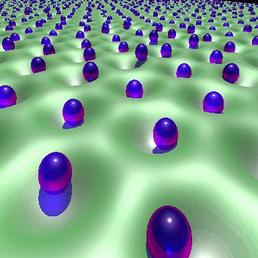Superconductivity

Superconductors are materials that show no electrical resistance if the temperature drops below a critical value. High temperature superconductors are studied for two reasons: (i) to support the design and realisation of practical systems and devices such as for example magnets for Magnetic Resonanz Imaging (MRI), and (ii) to learn about static and dynamic properties of the vortex matter which are an example of a system of interacting objects with competing interactions, and provided rich and complex behaviour.
Image: System studied in PhysRevB. 67, 174508 (2003)
For queries about this topic, contact Hans Fangohr.
View the calendar of events relating to this topic.
Projects

A Fast Multipole Method for the Bessel potential
Marc Molinari, Simon Cox (Investigators), Neil O'Brien
The fast multipole method (FMM) proposed by Greengard and Rokhlin provides a method by which the O(N-squared) many-body problem can be reduced to O(N) complexity. In this project, a multipole method is developed to calculate the energy of a system of vortices in a high temperature superconductor, where the many-body interactions give rise to rich and complex physics. The method developed here is suitable for systems where the interactions are governed by a Bessel potential rather than the usual logarithmic potentials occurring in gravitational and electrostatic problems. We derive and apply vectorised forms of the Gegenbauer addition formulae in order to achieve the O(N) scaling associated with fast multipole methods.

Designer 3D Magnetic Mesostructures
Hans Fangohr (Investigator), Matteo Franchin, Andreas Knittel
A new electrodeposition self-assembly method allows for the growth of well defined mesostructures. This project's aim is to use this method in order to fabricate supraconducting and ferromagnetic mesostructures. Numerical methods based on well-established models are used in order to characterise the grown structures.
Nonequilibrium Dynamics of Atomic Gases in Optical Lattices
Sophie Marika Reed
Many-body, quantum systems exhibit emergent properties which allows for quantum events to influence properties on macroscopic scales. Such emergent properties are studied using stochastic phase-space techniques.

Vortex Dynamics in High-Tc superconductors
Hans Fangohr (Investigator)
The dynamics of vortices in high temperature superconductors exhibits the complex and rich physics we expect from many body systems with competing interactions. Molecular Dynamics, Langevin Dynamics and Monte Carlo Computer simulations are carried out to understand this system in more detail.
People
 Simon Cox
Simon CoxProfessor, Engineering Sciences (FEE)
 Hans Fangohr
Hans FangohrProfessor, Engineering Sciences (FEE)
 Justin Lovegrove
Justin LovegrovePostgraduate Research Student, Mathematics (FSHS)
 Matthew Mostert
Matthew MostertPostgraduate Research Student, Engineering Sciences (FEE)
 Neil O'Brien
Neil O'BrienPostgraduate Research Student, Engineering Sciences (FEE)
 Lyuboslav Petrov
Lyuboslav PetrovPostgraduate Research Student, Electronics and Computer Science (FPAS)
 Sophie Marika Reed
Sophie Marika ReedPostgraduate Research Student, Mathematics (FSHS)
 Álvaro Ruiz-Serrano
Álvaro Ruiz-SerranoPostgraduate Research Student, Chemistry (FNES)
 George Winstone
George WinstonePostgraduate Research Student, Physics & Astronomy (FPAS)
 Petrina Butler
Petrina ButlerAdministrative Staff, Research and Innovation Services
 Matteo Franchin
Matteo FranchinAlumnus, Engineering Sciences (FEE)
 Andreas Knittel
Andreas KnittelAlumnus, Industry
 Marc Molinari
Marc MolinariAlumnus, Engineering Sciences (FEE)